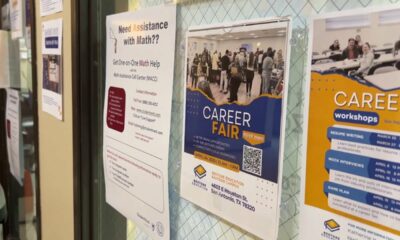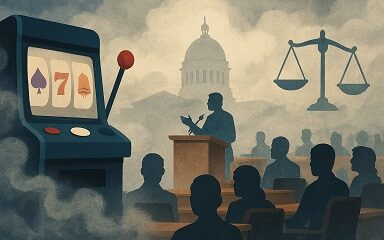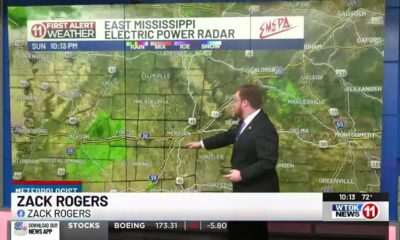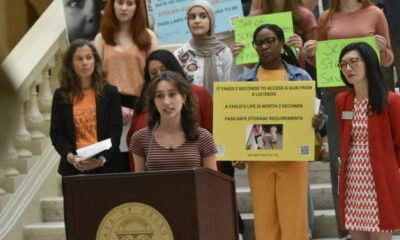News from the South - West Virginia News Feed
Quieter Weather Week Ahead; Early March Changes On The Horizon
SUMMARY: This week’s weather forecast, presented by Chief Meteorologist Chad Merrow, indicates a quieter weather pattern with clear skies. Temperatures will drop to around 23°F overnight, rising to a mild 50°F during the day. A low-pressure system from Louisiana will remain to the south, while moisture from the Northwest will bring light rain on Thursday, with no more than half an inch expected. A minor pattern change is anticipated around March 4-7, potentially leading to a moisture-laden system followed by colder temperatures. Overall, the week will feature sunny days and a brief chance of snow over the weekend.

FOLLOW US ON FACEBOOK AND TWITTER:
https://facebook.com/WOAYNewsWatch
https://twitter.com/WOAYNewsWatch
News from the South - West Virginia News Feed
Severe Weather Overnight; Rainy Week Ahead: Christian’s Latest Forecast
SUMMARY: Storm Watch meteorologist Christian Boler provided a weather update, forecasting severe weather overnight into tomorrow. Current conditions in Beckley are 66°F with 65% humidity. Severe weather alerts are in place for the Midwest, including tornado and severe thunderstorm warnings. Strong winds (40-50 mph) are expected, along with isolated tornadoes and hail. The area is under a slight severe weather risk, especially after 10 p.m. Wind damage is a key concern, and lawn furniture should be secured. A rainy week ahead includes storms and showers from tomorrow through the weekend, with temperatures staying between 60-70°F.

FOLLOW US ON FACEBOOK AND TWITTER:
https://facebook.com/WOAYNewsWatch
https://twitter.com/WOAYNewsWatch
News from the South - West Virginia News Feed
Stormy Weather Upcoming: Christian's Latest Forecast
SUMMARY: Storm Watch meteorologist Christian Boler provides a detailed 7-day weather forecast. Current conditions show Bluefield at 70°F with mostly cloudy skies and low humidity. A weather front arriving Sunday will bring showers and storms, with potential severe weather on Monday, including damaging winds gusting up to 60 mph. Tuesday offers a clearer day, while Wednesday sees a chance for pop-up showers. Another front on Thursday may cause heavier rain and storms. Expect a warm week ahead, dropping temperatures into the 60s by mid-week. Heavy rain and severe thunderstorms are expected, so stay tuned for updates.

FOLLOW US ON FACEBOOK AND TWITTER:
https://facebook.com/WOAYNewsWatch
https://twitter.com/WOAYNewsWatch
News from the South - West Virginia News Feed
Hometown Hero | Restaurant owner serves up hope
SUMMARY: In response to historic flooding in Welch, West Virginia, Roberto Diaz, owner of Latin Appalachian, transformed his restaurant into a hub for feeding flood-affected families. He and his team served over 50,000 free meals using makeshift equipment, dedicating themselves to helping the community without seeking profit. Diaz emphasized his belief that his mission was divinely inspired, working tirelessly to restore the town. Though the direct food distribution has ended, Diaz continues to support the community through fundraising efforts, raising nearly $15,000. His selfless actions have made a lasting impact, offering hope to those in need.

Roberto Diaz, owner of Latin Appalachian restaurant, stepped up to meet the need in Welch, West Virginia, when devastating flooding hit that town last month.
For more Local News from WSAZ: https://www.wsaz.com/
For more YouTube Content: https://www.youtube.com/channel/UCrcuU0JXXy8oIBqEB13mrwA
-

 Local News Video7 days ago
Local News Video7 days agoLocal pharmacists advocating for passage of bill limiting control of pharmacy benefit managers
-

 News from the South - Florida News Feed5 days ago
News from the South - Florida News Feed5 days agoFamily mourns death of 10-year-old Xavier Williams
-

 News from the South - Florida News Feed7 days ago
News from the South - Florida News Feed7 days agoLIVE: SpaceX NROL-69 mission launch
-

 News from the South - Alabama News Feed5 days ago
News from the South - Alabama News Feed5 days ago1 Dead, Officer and Bystander Hurt in Shootout | March 25, 2025 | News 19 at 9 p.m.
-

 News from the South - Arkansas News Feed6 days ago
News from the South - Arkansas News Feed6 days agoReport: Proposed Medicaid, SNAP cuts would cost Arkansas thousands of jobs, $1B in GDP
-

 News from the South - North Carolina News Feed6 days ago
News from the South - North Carolina News Feed6 days agoClassmates remember college student hit by car, killed near NC State
-

 News from the South - Alabama News Feed4 days ago
News from the South - Alabama News Feed4 days agoSevere storms will impact Alabama this weekend. Damaging winds, hail, and a tornado threat are al…
-

 News from the South - Oklahoma News Feed6 days ago
News from the South - Oklahoma News Feed6 days agoRep. Tom Cole Says DOGE Is ‘Pretty Responsive’ to His Concerns









































